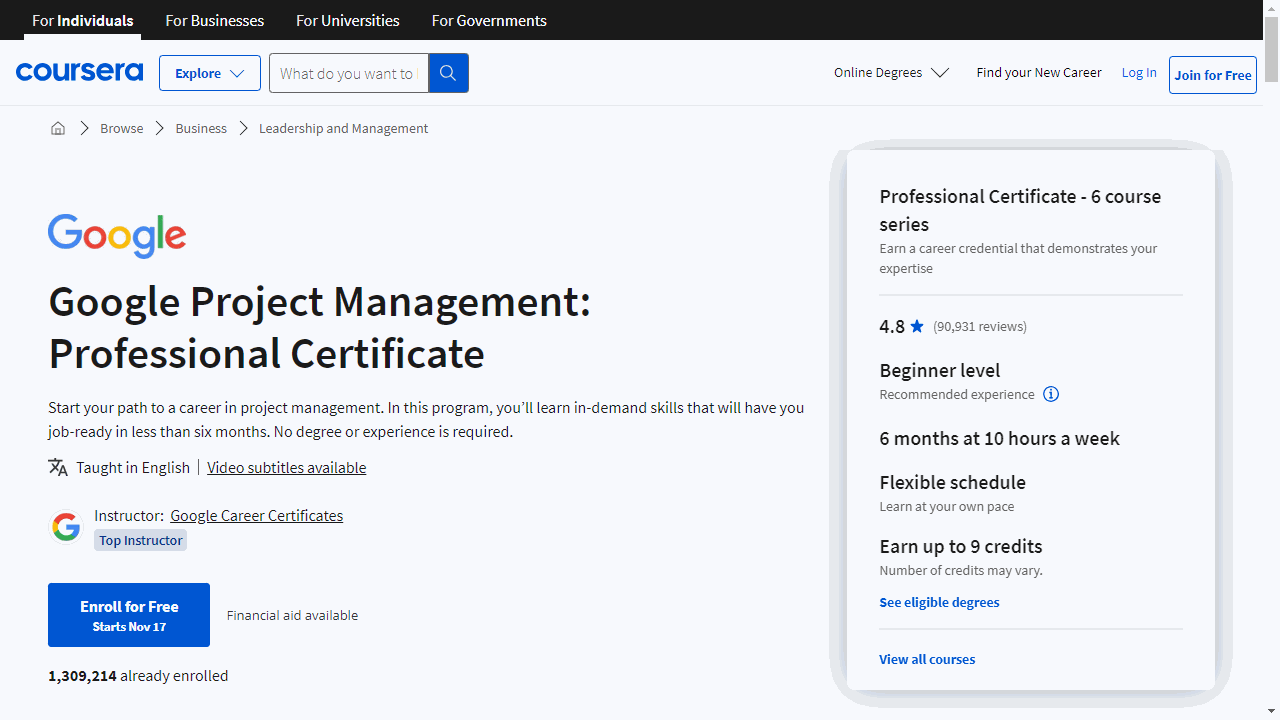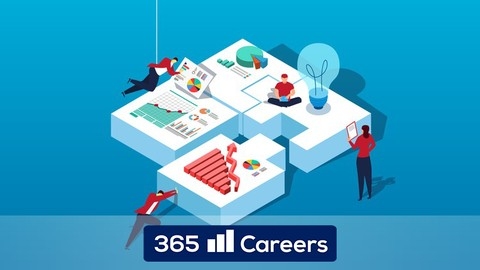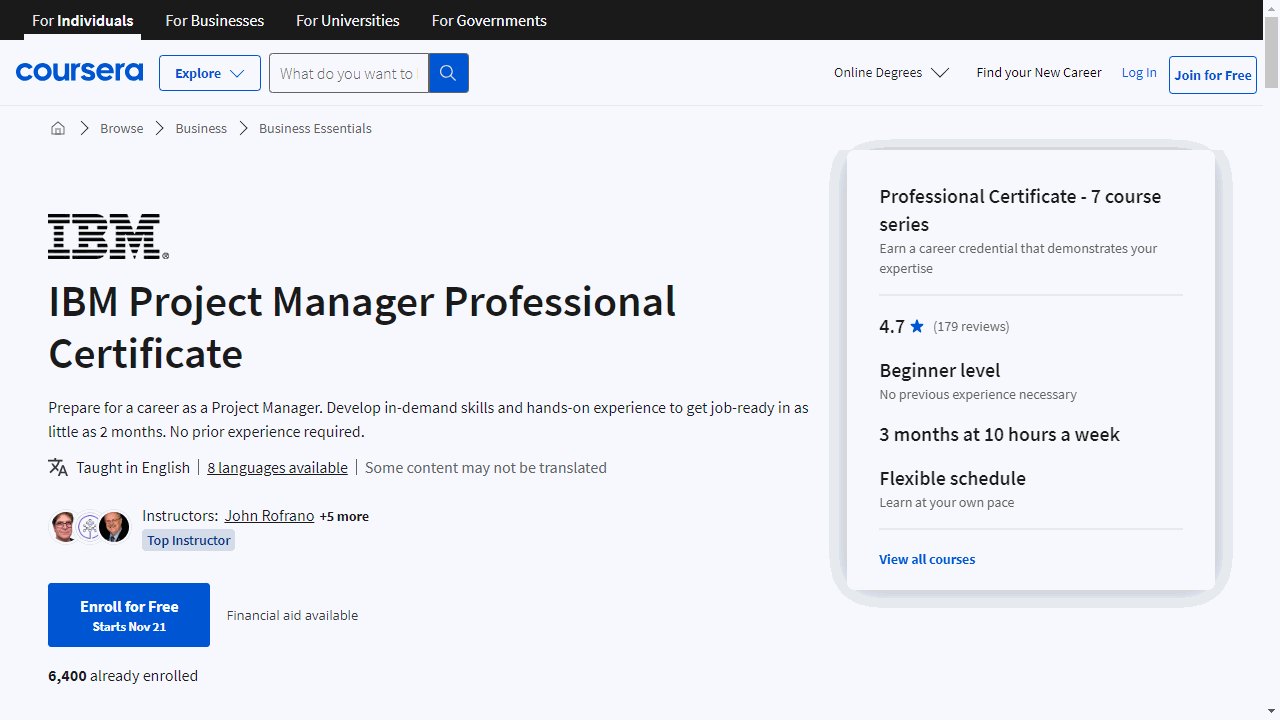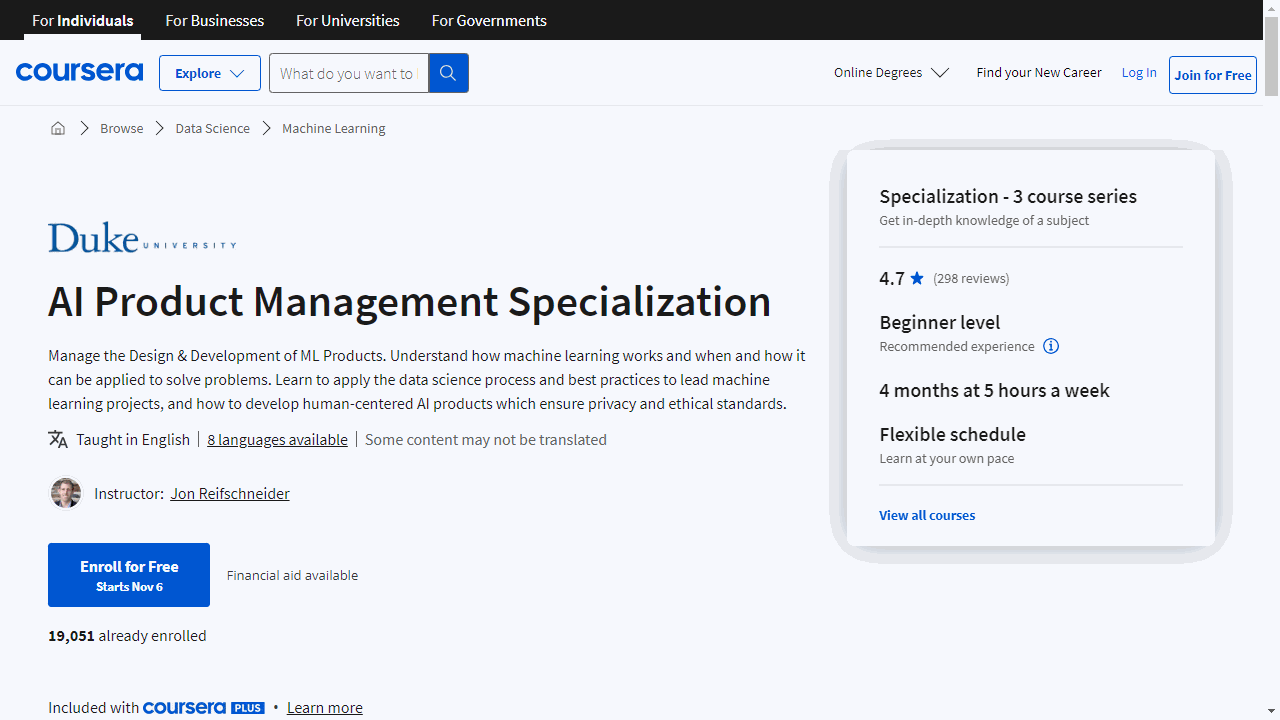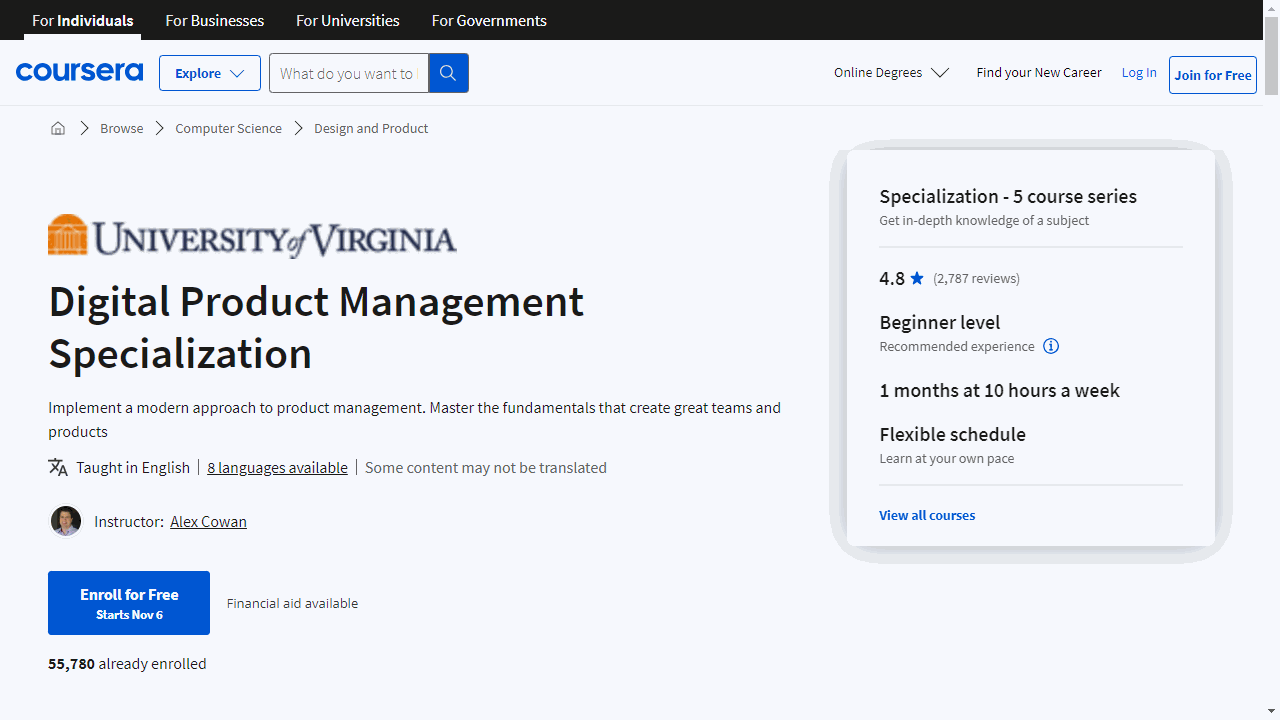Project management is the art of planning, organizing, and executing projects to achieve specific goals.
It’s a crucial skill in various industries, from software development and construction to marketing and event planning.
Effective project management ensures projects are completed on time, within budget, and to the required quality standards.
By mastering project management principles, you can enhance your career prospects, improve team collaboration, and deliver successful projects that drive positive outcomes.
Choosing the right project management course can be challenging with the abundance of options available online.
You’re likely seeking a course that covers essential concepts, provides practical tools and techniques, and aligns with your learning style and career goals.
You might be feeling overwhelmed by the sheer number of choices and unsure which course will best equip you with the skills you need to excel in project management.
Based on our thorough analysis, we believe the Agile Crash Course: Agile Project Management; Agile Delivery course on Udemy stands out as the best overall choice.
This comprehensive course provides a strong foundation in Agile methodologies, a widely adopted approach in today’s project management landscape.
It covers key Agile principles, practices, and tools, equipping you with the knowledge to manage projects efficiently and adapt to changing requirements.
However, if you’re looking for a course focusing on specific aspects of project management or tailored to a particular industry, we have other excellent recommendations to explore.
Continue reading to discover a variety of courses catering to different learning styles and career aspirations, including specialized programs for beginners, experienced professionals, and those seeking industry-recognized certifications.
Agile Crash Course: Agile Project Management; Agile Delivery
Provider: Udemy
This Agile Crash Course efficiently introduces you to Agile and compares it to other project management styles.
You will learn the 12 Agile Principles and understand the history behind this popular project management methodology.
The course then breaks down key Agile concepts like user stories, sprint backlogs, velocity, and more.
You’ll discover the roles within an Agile team, such as Scrum Master and Product Owner, and learn how to use important Agile tools like burndown charts and Kanban boards.
You will explore the rituals of Agile, including daily stand-ups and sprint reviews.
The course debunks common Agile myths, showing you how Agile can be used for projects in any field.
Through real-world examples like a Kanban board built in Microsoft Planner, you will see exactly how Agile concepts are used in action.
You’ll even learn how to use tools like Jira and ChatGPT to enhance your Agile projects.
This course provides several opportunities to test your Agile knowledge.
Optional practical activities, like completing an Agile retrospective, let you experience the Agile process.
Interactive games help you learn and retain important Agile information.
You will even find information on Agile job opportunities, common salaries, and advice on breaking down complex projects into manageable tasks.
This comprehensive Agile crash course will equip you with the knowledge you need to confidently manage projects using the Agile methodology.
Google Project Management: Professional Certificate
Provider: Coursera
This program gives you a strong foundation in project management, covering everything from the basics to advanced concepts like Agile and Scrum.
You’ll gain a thorough understanding of the entire project lifecycle, starting with how to define a project and ending with how to successfully close one out.
Google designed this program to equip you with practical skills through a hands-on approach.
You’ll learn from experienced Google project managers, gaining insights from their real-world expertise.
The course goes beyond theory, providing opportunities to practice what you learn through activities like building a project charter, developing a project plan, and analyzing real-world project documents.
What’s unique about this program is its focus on application.
You won’t just learn concepts – you’ll learn how to apply them in a realistic setting.
The program includes the development of a portfolio, which you can then use to showcase your newfound skills to potential employers.
The final capstone project simulates a real-world scenario, allowing you to synthesize everything you’ve learned and demonstrate your ability to manage a project from initiation to completion.
The Project Management Course: Beginner to PROject Manager
Provider: Udemy
This course takes you from the basics of project management to a professional level.
You begin by learning the basics of project management, understanding what projects are and the role of a project manager.
You learn about the project lifecycle, from starting a project to closing it out, and understand important terminology used in project management.
Next, you dive into each phase of a project.
You discover how to define goals, conduct feasibility studies, and create a project charter in the initiation phase.
You then learn to plan your project, including defining its scope, estimating time and budget, identifying risks, and managing potential changes.
You get hands-on experience creating Gantt charts using MS Project to schedule and visualize your project.
You learn how to execute your plan, lead meetings, manage your team, and track progress during the execution phase.
This course teaches you to monitor your project’s schedule, budget, and quality, making sure it stays on track.
You learn to manage risks and adapt to changes throughout the project.
Finally, you discover how to properly close a project, documenting what you learned and celebrating achievements.
This course also teaches you about Agile project management methodologies, such as SCRUM, and how they differ from traditional methods.
You explore key Agile concepts and the roles of different team members.
IBM Project Manager Professional Certificate
Provider: Coursera
This IBM certificate program provides a strong base in the fundamentals of project management.
You will explore the benefits, grapple with common challenges, and discover how recent trends like remote work and Agile methodologies are transforming the field.
The program doesn’t just cover theory – it dives deep into practical application.
You will learn how to initiate projects, plan effectively, manage risks, and lead teams.
You will develop crucial skills in communication, stakeholder management, and leadership.
You will also get hands-on experience creating essential project documents, including business cases, project charters, and risk registers.
You will explore various project management methodologies, including Agile, Scrum, and Waterfall.
You’ll learn to apply these methodologies in real-world scenarios and even get hands-on experience with popular project management tools like GitHub and ZenHub.
Through interactive labs and simulated projects, you’ll gain practical experience that directly translates to real-world project management.
The program culminates in a capstone project, giving you a chance to apply everything you’ve learned.
You will manage a project from start to finish using both predictive and adaptive methodologies.
This practical experience will solidify your understanding and equip you with a portfolio of work to impress potential employers.
If you are considering the CAPM certification, the program includes a practice exam to help you prepare.
Beginning Project Management: Project Management Level One
Provider: Udemy
In this Udemy course, you will quickly learn the basics of managing projects.
The course begins by introducing the five core project management life cycle groups: Initiating, Planning, Executing, Monitoring and Controlling, and Closing.
You then dive into each phase to understand the crucial components of project management.
You will begin with the fundamental concepts such as what defines a project and the responsibilities of a project manager.
The course then guides you through the creation of a project charter, a vital document that officially authorizes the project and empowers the project manager.
You also learn how to identify and manage project stakeholders, who are the individuals or groups that have a vested interest in the project’s success.
The course emphasizes the important balance between time, cost, and scope, known as the “Iron Triangle” of project management.
You learn how to define a project scope statement, create a project schedule, estimate project costs, and manage project risks.
You will then discover how to put your plans into action, manage a project team, host effective meetings, and communicate project status to stakeholders.
The course also covers the Monitoring and Controlling phase, teaching you how to monitor progress and make necessary adjustments, such as managing changes and balancing time, cost, and scope.
Finally, you learn how to wrap up a project efficiently.
This involves gaining customer acceptance and completing final reports.
AI Product Management Specialization
Provider: Coursera
This product management specialization equips you with the skills to manage projects that use Artificial Intelligence, starting with the fundamentals.
You will discover how machine learning works, its various types, and its real-world applications.
This foundation is key to collaborating effectively with data scientists and software engineers.
You will then move on to the practical aspects of managing machine learning projects.
You will learn to pinpoint opportunities for AI, collect and analyze data, build and deploy models, and ensure their continued smooth operation.
This specialization delves into the data science process, a structured method for organizing such projects.
Finally, you’ll explore the critical human element of AI.
You will learn to design AI products that prioritize user experience, privacy, and ethical considerations.
The course emphasizes human-centered design, prioritizing the user, and teaches how to identify and minimize bias in AI systems for fairness.
You will gain a deep understanding of how AI can complement human intelligence and decision-making.
Project Management Fundamentals
Provider: Udemy
This Project Management Fundamentals course teaches you everything you need to manage projects effectively.
You begin by defining your project and listing all the tasks involved using a Work Breakdown Structure, a technique for breaking down complex projects into smaller, manageable tasks.
The course utilizes tools like Post-it notes to visually represent and sequence tasks and identify task dependencies, highlighting the critical path – the sequence of tasks that dictate the overall project timeline.
You learn to create a Gantt chart in Excel to visually manage your project schedule and resources.
This involves identifying the critical path, adding tasks, and understanding resource allocation.
You also delve into the crucial aspect of risk management, learning how to identify potential obstacles and formulate strategies to overcome them.
The course doesn’t shy away from the financial aspects of project management; you’ll discover how to budget effectively and monitor costs to ensure your project stays financially sound.
You discover the importance of consistent progress monitoring throughout the project lifecycle.
The course guides you in using your Gantt chart to keep track of deadlines and manage your project effectively.
You’ll be capable of confidently tackling projects and successfully navigating the intricacies of project management.
Digital Product Management Specialization
Provider: Coursera
This program equips you with the skills to thrive as a modern product manager in our tech-driven world.
This specialization doesn’t just throw you into the deep end.
It starts with the fundamentals, covering how to pinpoint your product vision and utilize popular methods like Agile and Lean Startup.
You’ll learn to manage new products from scratch and breathe new life into existing ones.
Next, you’ll discover the magic that happens when Agile meets Design Thinking.
This course emphasizes building user-centric products – things people actually want.
You’ll master the art of usability testing, continuous delivery, and hypothesis-driven development, creating a unified vision within your team.
You’ll also dive deep into Hypothesis-Driven Development, learning to ask the right questions and use testing to validate your product ideas.
This is where you’ll really embrace a culture of experimentation, understanding how to achieve product/market fit and utilize the Lean Startup methodology.
The specialization then shifts to Agile Analytics, showing you how to build a data-driven product development process.
You’ll learn to create a powerful analytics infrastructure and use data to make informed decisions, ensuring your product stays ahead of the curve.
Finally, you’ll tackle the practicalities of managing an agile team.
This course equips you with the skills to lead a team using agile methodologies effectively, including creating a team charter, facilitating retrospectives, and selecting the right agile practices for your specific needs.
Also check our posts on:


